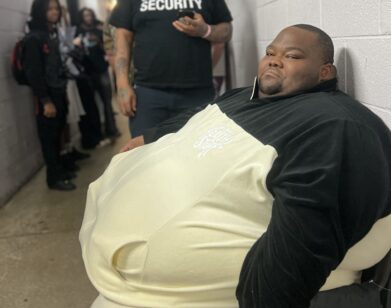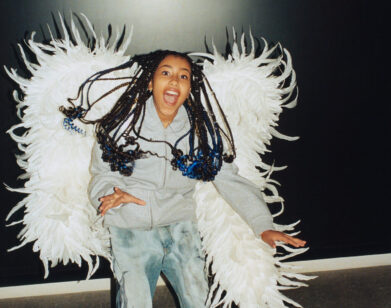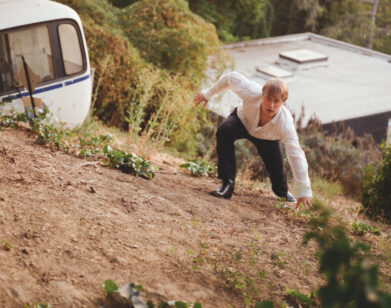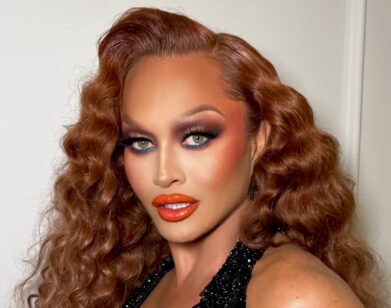Sam Sparro and Adam LambertAre Part of the Rhythm Nation
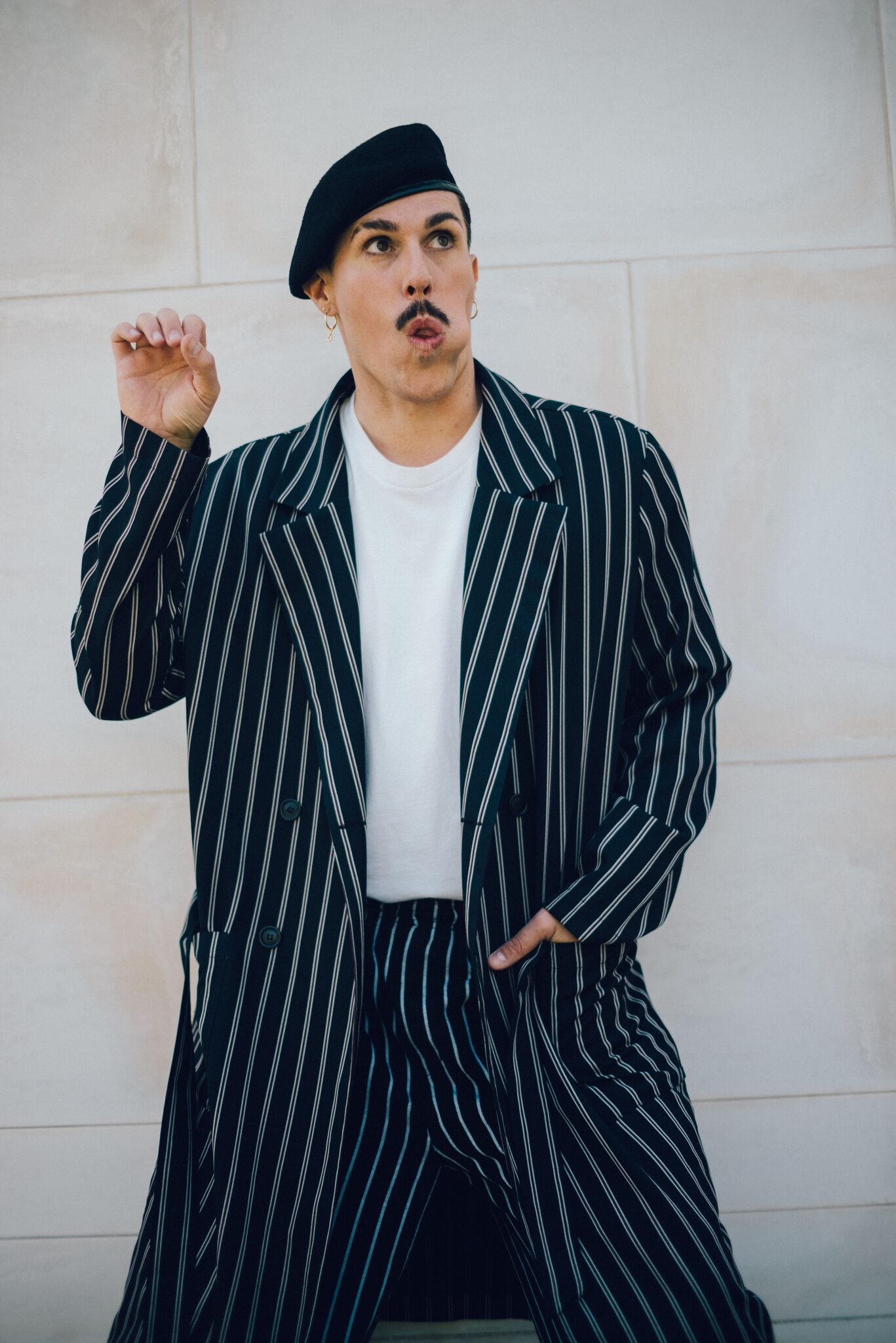
Photos by Kevin Posey.
Reinvention is tough to pull off, which is why the Australian pop vehicle Sam Sparro didn’t aim to reinvent himself with his new album Boombox Eternal. Instead, the 37-year-old singer-songwriter went back to his roots and created a 12-song album directly inspired by the ’80s beats of musical icons like Janet Jackson, Madonna, and Prince. Sparro first grabbed attention with his stylized and self-made 2008 single “Black and Gold”. The song fast-tracked his ascension to fame, quickly becoming a pop standard that was covered by the likes of Adele, Katy Perry, and Ellie Goulding. With his sophomore album Return to Paradise in 2012, Sparro proved once and for all that he was ahead of the game, creating thematically cohesive queer pop music with unconventional production. It’s been eight years since Sparro’s last album, a break that was dedicated to recovery from his struggle with alcohol and drug addiction. With the emergence of the new decade, Sparro has come out stronger with Boombox Eternal, an exuberant love letter to his dearest influences and his 8-year-old self. For Interview, Sparro called up his friend and frequent co-writer Adam Lambert to discuss making queer music and reminisce about one particularly wild Halloween party with Snoop Dogg and Miley Cyrus.
———
ADAM LAMBERT: Your last album was back in 2012, which I loved by the way. What happened between then and now? What kept you from releasing a new project?
SAM SPARRO: Thank you. Well, girl, it’s so funny because we’ve been friends for, god, I want to say almost 12 years?
LAMBERT: I know. You wrote a song with me on my first album, For Your Entertainment.
SPARRO: We go way fucking back. Do you remember when I was living in that loft?
LAMBERT: Yeah, I think I came to a party there once.
SPARRO: I was going through a total fucking personal crisis. I was like, smoking crack and drinking alone when I lived there.
LAMBERT: Shit. So, there’s that.
SPARRO: It feels really good to just be super honest and open about my life now. I just feel ready. Honestly, the time in between Return to Paradise, which is when I was trying to get myself together, and now—so much of that time was just about getting well.
LAMBERT: And now you’re sober, correct?
SPARRO: Seven years.
LAMBERT: That’s amazing, congratulations. After all that time getting sober and getting everything back together, what finally motivated you to get back in the studio for this project?
SPARRO: I’ve done some collabs and co-writes very selectively because I don’t like random people in my space. I finally—and I know you can relate to this—I felt like I stopped chasing a hit. I stopped chasing whatever was on the radio, or what I thought people wanted me to make. I just was like, “Fuck it, I’m going to make exactly what I want to make.” Which is a very nostalgic pop album celebrating my childhood. Life is too short. We just have to make what we love so we can stand next to, and be proud of it. I think people respond to that.
LAMBERT: At the end of the day, if you’re going to put yourself out there and put your name on something, it has to be something that you love. It can’t be something that’s plugged into some sort of commercial trend, that everyone says is the new thing, if it doesn’t work for you. It just doesn’t make any sense. I completely relate to you on that.
SPARRO: I mean, it’s nice when those two things line up.
LAMBERT: You have to play the game, to a point. I think having that artistic integrity is super important. It’s the only thing that we can really claim as ours. Hats off to you, I think that’s great. I was just listening to the album before this phone call. What I love about it is that it’s so specific. I hear your influences in it, I hear the time period that you’re honoring. It is fully nostalgic. My favorite kind of artistry is when you reference something and then put a twist on it. That’s you in there, I hear you.
SPARRO: I feel like this, more than any other project, is me not just as a songwriter and a singer, but really as a producer. I’m super proud of the production that I’ve done on this album. The vocal production, making that really modern and polished, does bring it into the contemporary landscape. I feel like Kanye West a little bit when people are like, “Well, what are you listening to?” And I’m like, “I’m listening to myself because my music is the shit.”
LAMBERT: I do the same thing. Absolutely.
SPARRO: You’ve really inspired me a lot over the years. I admire you so much. I’m so glad we’re friends and I’m so glad we work together. I’m just so proud of you and this record that you’ve made, as well. Because it’s the best stuff you’ve ever done.
LAMBERT: Thank you for that. Do you think this liberation that we’re both sorts of in the midst of has anything to do with where we’re at in the music industry, regarding queer people? It’s obviously changed a lot.
SPARRO: When we were starting our careers, there were so few queer artists.
LAMBERT: Remember, girl? It was a desert.
SPARRO: Crickets. It wasn’t considered an asset. People were trying to tone us down all the time.
LAMBERT: There was so much fear that you had to deal with. The people that you were doing business with—whether or not they were homophobic wasn’t the main issue. “Well, we don’t think this will work. We don’t think this will get put on the radio. We don’t think people will like this.” There was this attitude that anything queer was negative.
SPARRO: They were constantly trying to find ways to say that without saying it. It was just always these microaggressions from executives in the business. Now we’ve seen, because of the internet, that there’s a space for everybody, and everybody’s voice matters. There’s so much room for all types of identities. It’s changed a lot since we both started. For better and for worse.
LAMBERT: I do think that the market’s really saturated now. There’s a lot of new music, so it’s easy to feel like you’re getting lost in the shuffle. But I think you’re right. I think it’s easier than ever to find your audience because there aren’t all these gatekeepers, and people aren’t afraid of what you’re making. I know that I felt much more liberated when I was working on this project, in the sense that I could put the music out. I moved off of the major label system for this project. There are some disadvantages, but overall, I feel a sense of empowerment.
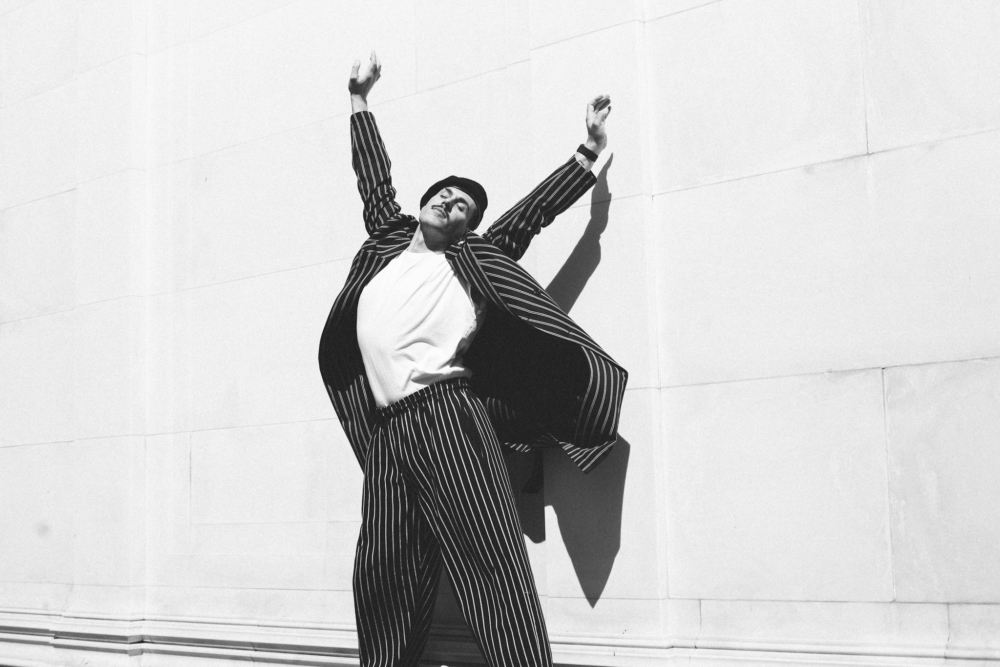
SPARRO: This is my first album without a major label as well. There are definitely struggles, but also, I feel so free. It’s worth making the sacrifices of all of the perks of the major label system to be able to sleep at night.
LAMBERT: When I put together a tour or one-off shows of my new music, that’s what matters to me. I want to be able to get up on stage and love every song. I’ve had moments in the past with some of the other tracks that I’ve done, even if they’ve been great pop songs, the heavy lifting has been done by a different producer and another writer. This is the style that’s, quote, unquote, cool. I don’t feel like it’s me, I feel like I’m posing. There have been a few moments of that, and when I realized it on a tour a couple of years ago, I was like, “Ah, shit. You can’t let this happen again.”
SPARRO: We live, we learn. We learn what we can deal with, and what we can’t.
LAMBERT: As artists, we’re sensitive. You end up becoming your own worst critic. And you’re your own worst enemy—I’ve been that to myself. It causes you to overthink and to forget the big picture, and I think as we get older, it’s a little easier to zoom out, and be like, “Ah, okay. Broad strokes.”
SPARRO: I did an interview earlier today, and they asked me, “If you could talk to your eight-year-old self, what would you say?” It’s a very Rupaul’s Drag Race question, but I thought about it for a second, and I thought, “I would tell myself: be nicer to yourself.”
LAMBERT: [Laughs.] We’ve all heard it for years, but it feels more clear to me now—that if you’re not loving yourself or enjoying what you’re doing, how is the audience going to? Side note: “Black and Gold” was my fucking jam. I remember when that came out, it was my workout song, it was my getting ready song, it was my driving song. It was just so cool. How did that first big hit come to be?
SPARRO: I’ve kind of gone back to the way it was then, in a lot of ways. I was super autonomous. I was making tracks in my bedroom, on my laptop. I had no money, I had a very cheap and disgusting microphone that I recorded half of that album on. I had a mini keyboard that was missing two keys. I was doing all my own graphic design, I was making flyers, I was doing little shows at the Echo and at the Roxy with my friend Jesse on my laptop. I was just doing so much of it myself.
LAMBERT: Do you feel like that’s where the real creativity was really pumping?
SPARRO: I’ve come to feel that I’m not necessarily a part of the music industry. But I’ve started to see myself as more of a multimedia artist that makes music. The cover of “Black and Gold” is a selfie with a logo that I designed. I love making stuff, dressing up, doing the shoots. [“Black and Gold”] was on Myspace, then Radio 1 played it. Then I signed with Universal.
LAMBERT: Myspace, oh my god.
SPARRO: Myspace, girl.
LAMBERT: Myspace was it.
SPARRO: The legend. The only.
LAMBERT: The moment.
SPARRO: The icon. We were coding. We thought we were hackers.
LAMBERT: Didn’t “Black and Gold” get covered by Katy Perry and Adele?
SPARRO: And Ellie Goulding. That song has somehow become a standard. It’s in every karaoke bar I’ve been to around the world. People sing it for their American Idol auditions.
LAMBERT: That’s just so cool. Your new album, I was flashing back to being in my bedroom in the early ’90s. It’s so fresh. What are a couple of specific songs or artists that directly influenced this project for you?
SPARRO: Janet Jackson’s Rhythm Nation was a big influence. Dangerous by Michael Jackson—I was obsessed with that one. I wore that tape out. My mom had to buy me a new one. Weirdly, in hindsight, thinking about this album, another influence is Prince, Sign ‘O’ the Times era. Actually, the Batman soundtrack. That was amazing.
LAMBERT: Lyrically, what are you singing about?
SPARRO: A big part of the album is escapism and love and joy. That was a big thing in the ’90s, too. Looking toward a brighter future where there’s no racism or sexism. But then, there’s heavier material. “Save A Life” is about contemplating suicide, which was something I experienced. And pressures about modern anxiety, which is a big part of our lives today.
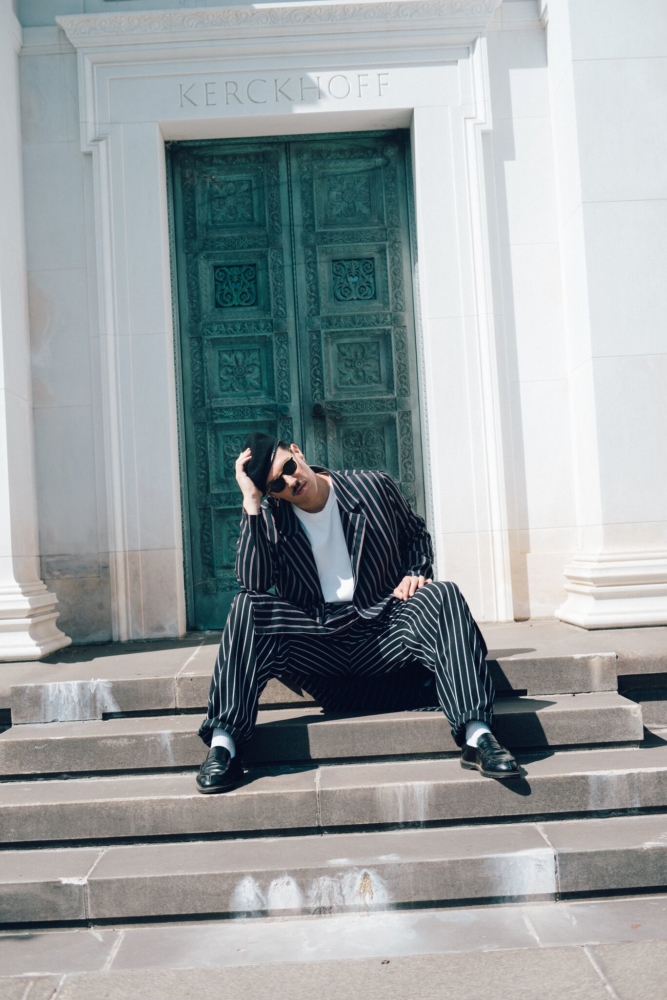
LAMBERT: It’s like a slice of your life, literally. On a personal level, you recently got married. Did that directly influence any of the songs?
SPARRO: I had a muse that I was in love with that inspired all the love songs here. Also, having someone in my life that is so different from me. I am emotional, I’m impulsive, I’m intense. He’s so grounded and so stable. Having him in my life has grounded me in a lot of ways.
LAMBERT: I was so sad that I had to miss it, because I was traveling. I was on tour. I was bummed. I want them to develop this hologram technology so we can just beam in for things.
SPARRO: I think they’re not that far away. That Miley Cyrus episode of Black Mirror?
LAMBERT: Ashley O. I love Miley. Where is Miley? Let’s call Miley. She’s so hot.
SPARRO: I was thinking about, just as you said that, that Halloween party that you had where she was dressed as Lil’ Kim and I performed. Wasn’t Snoop [Dogg] there, dressed in the Scream mask?
LAMBERT: I think he was. There was a lot of smoking going on. That was a wild party. What do you think is next for you?
SPARRO: I went so long in between making albums, and I’m actually already halfway through my next album. Not to jump so far ahead, but I’m really excited about it. It’s definitely less nostalgic. It’s electronic, it’s dance-y, there’s elements of house and weird electronica.
LAMBERT: I can’t wait to hear it. Sam, I’m so glad that we’re still friends, and that we are interviewing each other for Interview Magazine. It’s so cunt.

